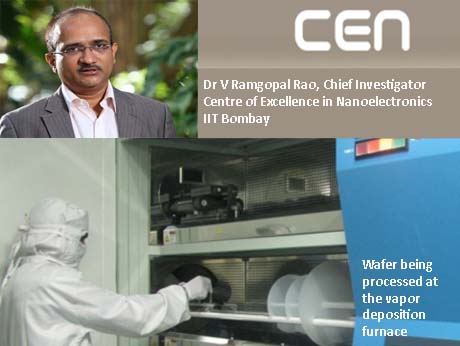
Bangalore February 12, 2014: Imagine being able to detect an imminent heart attack from a drop of the patient's blood -- after 10 minutes of a test that costs a hundred rupees! The muscles of the heart under stress release a protein which can be detected thanks to nanotechnology.
Imagine an 'electronic nose' that can safely sniff the presence of explosives like TNT, RDX or the hard to detect plastic explosive, PETN, analysing its very low vapour pressure -- again using nano materials!
These are not from the realms of fiction, but hard fact -- achieved by Dr V Ramgopal Raoand his team at the Centre of Excellence in Nanoelectronics (CEN) , at IIT Bombay, after a decade of intense research in nanoscale devices, circuits and sensors.
The work on cardiac attack prevention was undertaken, based on a project from the National Programme on Micro and Smart Systems (NPMASS) funded by the Defence Research and Development Organisation ( DRDO). After 7 years of work at the Centre, prototypes are currently being built for tests by a teams of cardiologists under the supervision of the Indian Council of Medical Research (ICMR). The sensors are being manufactured at the DRDO's Bangalore-based Society for Integrated Circuit Technology and Applied Research (SITAR).
The project on explosives detection grew out of an assignment from the Principal Scientific Adviser to the Prime Minister's office in 2008. Ten prototypes of the test kit-- some mounted on remotely operated robotic 'sniffers' – will be tested by multiple Indian security agencies in the next one year. Once validated the technology will make India one of a handful of nations with the ability to detect and neutralize explosives in terrorist scenarios, in a safe and timely fashion, said Prof Rao in the course of a special briefing for IndiaTechOnline. The larger goal is to deploy large detection sensor networks, fueled by nano technology at public places like bus terminals and railway stations, he added.
Prof Rao has over 350 publications in the area of Electron Devices & Nanoelectronics in international journals and conference proceedings and is a co-inventor of 25 patents, either awarded or pending. He has supervised over 100 Masters students & 22 Ph.D. students at IIT Bombay in the area of Nanoelectronics since the year 2000.
The primary focus of Prof. Rao's research has been the deep understanding of the impact of materials and device design on nanoscale devices, circuits and sensors, and utilizing this understanding in the engineering of semiconductor devices and systems to deploy them in critical areas like healthcare and security.
A Shanti Swarup Bhatnagar Prize winner in 2005, Prof Rao was last week, the recipient of the Infosys Prize for 2014 "for his wide-ranging contributions to nanoscale electronics, for insightfully integrating chemistry with mechanics and electronics to invent new functional devices, and for innovation and entrepreneurship in creating technologies and products of societal value "
Under his leadership, IIT Bombay has emerged as the hub of multi-disciplinary activity, as well as a key node of the Indian Nanoelectronics Users Program involving 92 institutions, which has provided a significant impetus to the growth of the semiconductor industry in India.
Some of his work on sensor technologies in the CEN is being passed on for techno commercial exploitation to NanoSniff Technologies Pvt. Ltd., an IIT Bombay-based Product R&D incubation company.